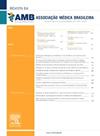Radiofrequency us and overdiagnosis of atherosclerosis in individuals with psoriatric arthritis.
IF 1.3
4区 医学
Q2 MEDICINE, GENERAL & INTERNAL
Revista da Associacao Medica Brasileira
Pub Date : 2023-07-17
eCollection Date: 2023-01-01
DOI:10.1590/1806-9282.20230182
引用次数: 0
Abstract
Dear Editor, Atherosclerosis is an inflammatory vascular disease, caused by the deposition of cells, lipids, and tissue debris in the vascular intimal layer. Among the risk factors for this disease are sedentary lifestyle, poor diet, systemic arterial hypertension, and smoking1. Psoriasis is a common chronic inflammatory disease of the skin, with characteristic features of erythematous plaques demarcated by whitish scales. It is not only restricted to skin involvement but can also affect joints and other organs. Thus, psoriasis is not a specifically dermatological pathology but a systemic one, as demonstrated in studies that indicate a higher prevalence of diabetes and cardiovascular disease correlated with the severity of psoriasis2. Thus, when reading the article by Ozisler C, Kaplanoglu H, Sandikci SC, Ozisler Z, entitled “Evaluation of subclinical atherosclerosis by ultrasound radiofrequency data technology in patients with psoriatic arthritis,”3 one can see the importance of highlighting elements relevant to the management of psoriatic arthritis, atherosclerosis. Thus, the magnitude of the structural differences in the arteries between the group with psoriasis and the control is notorious. Hence, when comparing the variables in Table 2 of the aforementioned article, through the calculation of Cohen’s d, it is possible to show that in all of them there are effects considered to have a moderate to very large real impact. In view of this, it is possible to conclude that these probabilistic and structural measurement differences may have diagnostic or prognostic utility. However, they are still just differences. Furthermore, the identification of structural alterations still in the preclinical phase can reduce the incidence of cases with clinical manifestations and, therefore, false positives and overdiagnoses4. Therefore, the finding of greater thickening and stiffness in the structure of the carotid artery in individuals with psoriasis, as well as this identified subclinical state, need to be clarified as really pathological in view of their possible impacts on the outcomes of clinical manifestation and death. Thus, it is worth mentioning that the indiscriminate use of diagnostic/prognostic tests without estimated effectiveness on the prescription and therapeutic results causes psychological, financial, and physical loss to individuals undergoing unnecessary treatments, in addition to excessive costs to the health system. We therefore recommend that future studies should focus on the follow-up of individuals with psoriasis, assessing the difference in outcomes under and without treatment, and in the population, in which atherosclerosis and psoriasis do not coexist.银屑病关节炎患者动脉粥样硬化的射频超声与过度诊断。
本文章由计算机程序翻译,如有差异,请以英文原文为准。
求助全文
约1分钟内获得全文
求助全文
来源期刊
CiteScore
2.20
自引率
0.00%
发文量
276
审稿时长
12 weeks
期刊介绍:
A Revista da Associação Médica Brasileira (RAMB), editada pela Associação Médica Brasileira, desde 1954, tem por objetivo publicar artigos que contribuam para o conhecimento médico.

 求助内容:
求助内容: 应助结果提醒方式:
应助结果提醒方式:


